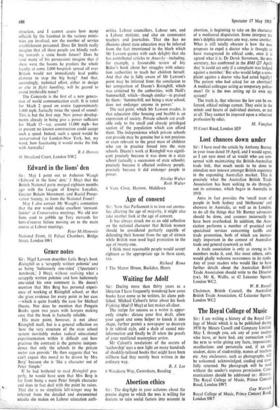Grace notes Sir : Nigel Lawson describes Leila Berg's book
Risinghill as a `scrappily written polemic' and as being `ludicrously one-sided' ('Spectator's notebook,' 3 May), without realising what a scrappily written polemic and how ludicrously one-sided his own comment is. He doesn't mention that Mrs Berg has personal experi- ence of working at Risinghill school, or that she gives evidence for every point in her case —which is quite frankly the case for Michael Duane. Nor does he mention that Penguin Books spent two years with lawyers making sure that the book is factually reliable.
His main point, however, is not about Risinghill itself, but is a general reflection on `how the very structure of the state school system inevitably makes radical educational experimentation within it difficult and how precious (by contrast) is the genuine indepen- dence that only the schools in the private sector can provide.' He then suggests that 'we can't expect this moral to be drawn by Mrs Berg' because she is 'like a character out of Peter Simple.'
If he had bothered to read Risinghill pro- perly, he would have seen that Mrs Berg is far from being a mere Peter Simple character and does in fact deal with the point he raises. That she is no simplistic left-winger may be inferred from the detailed and documented attacks she makes on Labour education auth- orities. Labour councillors, Labour MPs, and a Labour minister, and also on communist teachers and journalists. That she has no illusions about state education may be inferred from the fact (mentioned in the blurb which Mr Lawson quotes with such delight) that she has contributed articles to Anarchy—including, for example, a favourable review of Joy Baker's book about her struggles with educa- tion authorities to teach her children herself. And that she is fully aware of Mr Lawson's point may be inferred from the conclusion to her comparison of Duane's Risinghill, which was criticised by the authorities, with Neill's Summerhill, which—though similar—is praised by them : `Summerhill, not being a state school, does not endanger anyone in power.'
The real point, which Mr Lawson evades, is that education (like housing and health) is an expression of society. Private schools are avail- able only to the small and already privileged section of the population which can afford them. The independence which private schools can provide may be genuine but is not precious or even relevant to the great mass of children who are in practice forced into the state schools. Duane's work at Risinghill was signifi- cant precisely because it was done in a state school (actually a succession of state schools), precisely because it affected ordinary people, precisely because it did endanger people in power.
Nicolas Walter Ruth Walter 4 Vane Close, Harrow, Middlesex






































 Previous page
Previous page